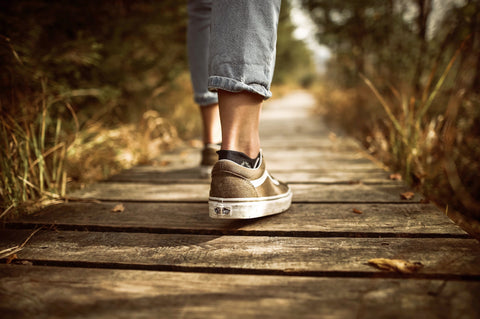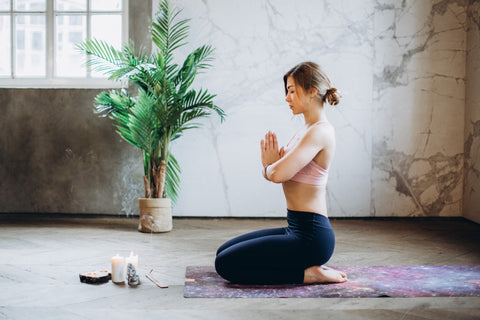“Walking is man’s best medicine.”
-Hippocrates, ancient Greek physician 460-370 BC
A basic, biological function, one that our existence necessitated from, yet in today’s modern world few participate enough in- the simple act of walking.
According to the Mayo Clinic, most of us spend 90% of our lives indoors.
Walking is something our ancestors did out of necessity. Pilgrimages, hunting and gathering were a way of life. Today, the simple practice of walking, for leisure or otherwise, has become a thing of the past for many. With vehicles, desk jobs and the convenience of elevators and escalators, many people are walking less and less. In my practice, there is a marked difference between those who are walkers and those who are not. The list of complaints I receive from clients who live sedentary lives and tend to walk the least are maladies such as back pain, digestive issues, join stiffness and food cravings, to name a few. It doesn’t help that many people live far from their workplace and commute for a lengthy time each day, or work many hours at a time, at home. Yet, like so many things in life, there is always a choice, a conscientious decision that we can make to improve our life and our wellbeing.
Some Benefits of Walking
There is a plethora of benefits that come from walking daily for 30 minutes or more. This is a short list of some of them.
- Reduced body fat
- Better balance
- Stronger bones and muscles
- Reduced risk of heart disease or stroke
- Reduced stress levels and depression
- Reduced joint stiffness
- Increased circulation
- Increased well being
While exercising at the gym can promote muscle growth and all the byproducts that come with it, exercising in this manner, especially high intensity training, is and should be done only a few times a week. What are we doing the other 5 or 6 days? Some people participate in classes such as yoga or cycling which can provide benefits, but this too is a regimented routine, often performed indoors.
I’m not suggesting that walking should replace your workout regimen since I don’t consider walking to be exercise in the same sense. But I also don’t think trudging indoors on a treadmill should replace the beneficial walk outside. The two are completely different modes of movement. Outdoor, natural walking holds other benefits that you might be missing out on.
When I suggest to clients that they should walk more as an adjunct to their workout sessions, many smile politely while immediately dismissing the idea, or outright scoff. Others nod in agreement knowing very well that they would feel better if they walked more. The simplicity of walking is a highly underrated health and wellness practice. We tend to think that we need to struggle or put in a lot of effort to achieve meaningful results. As innocent and simple as it seems, walking can hold a trove of health benefits.
Why Walking Outdoors Is Key
There are many benefits to walking outdoors as opposed to simulating the act of walking indoors, such as on a treadmill. For starters, walking gets you outside! We spend far too many hours indoors, and if you live north of the equator, you just might be spending every waking hour indoors. Being indoors for too long can leave us feeling listless. It is important to take a breath of fresh air every day.
Grounding
There is new evidence to suggest that grounding (having your bare feet in contact with the ground while walking or standing) can have tremendous health benefits. The negative ions that are in the ground can be conducted through our bodies and improve our overall well being. Take off those socks and shoes and get grounded.
Daylight Exposure
Getting sun exposure on bare skin is an important benefit you get from walking outside. Even in the winter, having some natural daylight or ambient light on your face can be invigorating. You’ll also be receiving some essential vitamin D.
Better Vision, peace of mind
Walking outdoors allows for eyes to see into the distance, something we can all use more of. We are constantly looking at screens; even gyms have televisions for you to stare at while engaging in activity. Some people watch shows or programs while treading that cause them to be on high alert, such as the latest news, which defeats the purpose of a peaceful, leisurely, health-promoting stroll.
It is important for your eyes to look into the horizon and to get natural light from the sun and atmosphere.
Better Feet
Another important benefit you can get on your walkabout is better foot health. Your feet (and body) are designed to walk on diverse terrains. Walking outdoors exposes you to a variety of surfaces and may enhance your flexibility, your balance and your gate. This may lead to stronger, more agile feet and an overall healthier, more balanced body.
Oxygen
Spending our days indoors can expose us to stale air. Dust, air conditioners, heaters and people pollution can leave us breathing in dry, contaminated air. Bacteria and other microbes can create an atmosphere that may challenge the immune system. Give yourself a boost and break by stepping outside.
Ancient Greek philosophers such as Socrates would engage in peripatetic dialogues, that is, conversations about various topics such as the meaning of life and politics of the day, whilst walking. Indeed, walking can clear the mind and promote creativity. Next time you’re feeling sluggish at work, or having a mental blockage, excuse yourself and take a walk.
Walking can also be a form of meditation. I often use walking as a means of introspection and reflection.
Satisfying /Better mood
Walking outdoors is fun and feels good! Personally, I go on lengthy walks every day and on days I don’t, I feel like something valuable was missed. Once it becomes a way of life, you won’t be able to go without it.
How Long Should I Walk For?
Stats online suggest that on average, most people get around 4000-5000 steps in per day. Start slowly and work your way up.
How many steps you should take or how long your daily walks should be depends entirely on who you are. If you have injuries, are very overweight or have other health concerns, talk to a specialist. If you’re not use to walking, start with a 15-minute walk at a normal pace for a few days and work your way up. Remember, the point of going for a daily walk isn’t to ‘work out.’ It’s a mechanism used to simply move the body naturally and break up the day from our duties. It creates balance and through that balance other health benefits care emerge. You may choose to walk for 5 minutes or one hour, it’s completely up to you.
What If I’m Bored?
Some of us are better at being alone than others. If you find that your walks are lonely or your mind is racing, you can enjoy some music or a podcast on your walk. In fact, listening to music can also be another form of meditation for the mind.
Footwear
Find shoes that are comfortable for you with support and room for your feet to move in. Address any issues such as gout, bunions, or other foot abnormalities and always consult with your doctor if you need extra care for your feet before embarking on your walkabout.
At Which Cadence?
Studies show that those with a naturally fast cadence when walking live longer. If after an hour walk you don’t feel like you did much, consider speeding up your pace a little. Walking shouldn’t feel like you did nothing.
Walking tends to be an underrated activity, one that many people could use more of. Unlike workouts at the gym, walking should be used as a mechanism for getting fresh air, clearing the mind and revving up the circulation. The daily practice of walking can help you get more much needed sun exposure, fresh air, limber up the joints, stretch the muscles, clear the mind, soothe your eyes and allow you to take a break from the daily grind. You don’t need any special equipment or pay membership fees; walking is free and freeing. Set an alarm to remind yourself to go on your daily walkabout. Bring a friend if you need the company or go solo on a contemplative excursion. You might find that your creative skills are ramped up on a walk and are better able to find solutions you were struggling with earlier that day. If you’re feeling sluggish, stiff or unfocused, perhaps it’s time to walk it off.





Comments (0)
There are no comments for this article. Be the first one to leave a message!